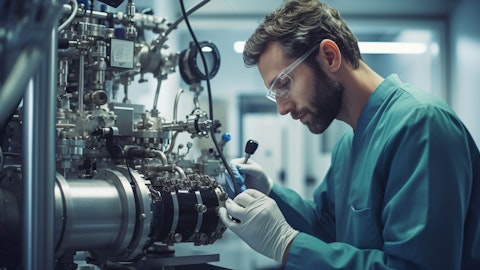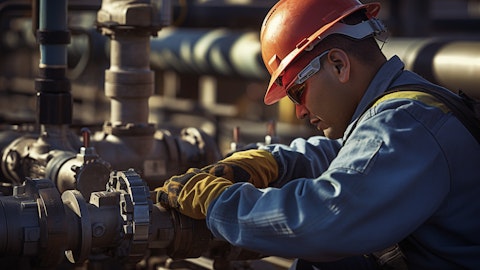So I think one other aspect that would put is a net positive for us. We continue to find ourselves in proprietary spaces, having conversations with people generally where it’s only the two of us. And so that’s – that I think that’s important in this environment, too. That gives you a bit of a head start. But the takeaway here is absolutely urgent. I mean we’re putting the time in. We’re putting the effort in. We are narrower in our focus because we are looking for things that attach well and scale quite naturally within these niches, but – and we’re doing it in a proprietary basis, but we are super careful about where the line needs to end on valuation for us.
Matt Summerville: Got it. And then just as a follow-up, could you maybe spend a minute talking about kind of the ultimate duration and strength of the muni water and wastewater cycles as you kind of see it playing out for IDEX? Thank you.
Eric Ashleman: Yes. I think, as I’ve said a couple of times before, I don’t think it launches with a lightning bolt or a bang, but actually, the duration of it is going to be very durable. You’ve had a lot of intentional funding announcements put out there. Those always take a while to find their way home and funded projects that have been engineered and are now being deployed. So, I think what’s very positive about this cycle is the – and I can’t think of another one where I’ve seen this much intentional focus, and frankly, this much unfortunate reinforcement in terms of things in systems that are just not able to cope with the current climate that we have out there. So you put those two things together, and what we know is that level of confidence is what it really takes for engineers and municipalities and industrial spaces to do the work, to make it through the budget cycles, the inevitable number of conversations to get things approved to get them in front of us.
The last point I always remind external folks to consider when they think of our water businesses, a lot of what we’re doing is analysis. So we’re doing infrastructure analysis and then providing that over generally for a technical part of our customer set. And so in that way, we’re actually well positioned to kind of – as a diagnostic at the beginning of the cycle because much of the time, they’re using our information and our output to substantiate larger capital projects. And so kind of here in the beginning of a multiyear cycle is a good place for IDEX to be because we’re actually helping them put the projects together that’s going to extend the cycle overall.
Matt Summerville: Great. Thanks for the color guys.
Eric Ashleman: Thanks.
Operator: Our next question comes from the line of Rob Wertheimer with Melius Research. Please proceed with your question.
Rob Wertheimer: Thank you very much. Eric, you touched on an interesting topic in your opening comments just on semiconductors and the AI shift, which is obviously driving huge teaches [ph] in demand, pricing power, all sorts of things, across pockets of industrials. I wonder, do you have any expanded remarks on what your exposures there? How your technological capabilities are changing? Whether you’re entering kind of a new segment of semiconductors? Anything you can flesh out there if you’re willing.
Eric Ashleman: Yes. No, I appreciate it. I mean it’s still a modest portion of IDEX overall, but it’s growing, and it’s growing and has found its way into the portfolios of some of the things we’ve recently acquired in HST. So we’re certainly more interested and focused on it. And as we’ve brought those technologies in, I mean, we thought about this revolution and the jobs to do within it, particularly the hardest ones is our number one area of interest. So we’re often going right into lithography instruments and some of the most advanced that are out there because those are the ones that are being called upon to do the work to create the chip architecture that’s going to support the hardest piece of this. So we’re well indexed there.
We’ve long had a metrology portion of our business that’s all about validating that, that job was done well. Even on the piece within water that we have that’s somewhere semi-focused, I mean its absolute critical water purification, delivery and heating. And we talked about that in our sustainability report as one of the best eco-friendly solutions we have in the whole company. And so it’s a broad market. It’s fragmented and segmented into different uses and technologies. But you can think of us as generally thinking about what are the hardest jobs to do that provide the most critical differentiation when they are done because typically, for us, that’s where the most economic benefit comes from. And so we’re tracking a lot of that – those different trends, the size of ships, the way that they’re being packaged and looking for all the ways that we can play there.


